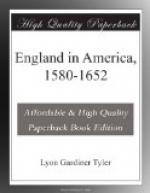In another particular Endicott showed the summary character which distinguished him. When Morton arrived in London a prisoner, in 1628, Isaac Allerton was trying to secure from the Council for New England a new patent for Plymouth colony. In Morton he appears to have recognized a convenient medium for reaching Sir Ferdinando Gorges; at any rate, when Allerton returned to New England in the summer of 1629, he brought Thomas Morton back with him, to the scandal of the Plymouth community.[15] After a few weeks at Plymouth, Morton repaired to Merry Mount and resumed the business of a fur-trader, but, as might have been expected, he was soon brought into conflict with his neighbors.
Endicott, it appears, not long after Morton’s return, in pursuance of instructions from England, summoned all the settlers in Massachusetts to a general court at Salem. At this meeting, according to Morton, Endicott tendered to all present for signature articles binding them “to follow the rule of God’s word in all causes as well ecclesiasticall as politicall.” The alternative was banishment, but Morton says that he declined to subscribe without the words in the Massachusetts charter, “so as nothing be done contrary or repugnant to the Lawes of the Kingdome of England.” Endicott took fire at the independent claims of Morton and sent a party to arrest him. They found Morton gone, whereupon they broke into his house and appropriated his corn and other property.[16]
Meanwhile, in England, an important determination had been reached by the leaders of the Massachusetts Company. At a general court, July 28, 1629, Cradock, the governor, read “certain propositions conceived by himself” for transferring the headquarters of the company to America.[17] The matter was held in abeyance, and the members present were instructed to consider the question “privately and secretely.” August 26 twelve of the most influential members, among whom were John Winthrop, Isaac Johnson, Thomas Dudley, and Richard Saltonstall, bound themselves by a written agreement at Cambridge to emigrate with their families to New England if a transfer of the government could be effected.[18]
Three days later the company held another meeting, when the removal was formally proposed and carried. Accordingly, such of the old officers as did not wish to take part in the emigration resigned their places, and for governor the choice fell upon John Winthrop, a wealthy gentleman of Groton, in Suffolk, and for deputy governor upon Thomas Dudley, who had been steward of the earl of Lincoln. The ultimate effect of this brilliant stroke was to convert the company into a colony.[19]
This change of policy was taken when affairs looked particularly dark in England, for it was about this time that King Charles, provoked at the opposition of Parliament, entered upon his policy of ruling without one. March 10, 1629, Parliament was dissolved, and no other was called for a space of eleven years. Several of the most eminent members were languishing in the Tower of London, and the king’s proclamation of March 27 announced that he would “account it as a presumption for any to prescribe any time unto us for Parliaments, the calling, continuing, and dissolving of which is always in our power."[20]




